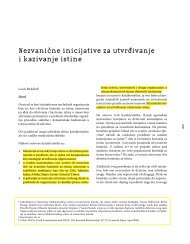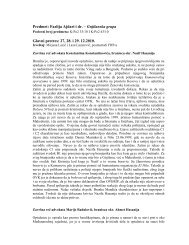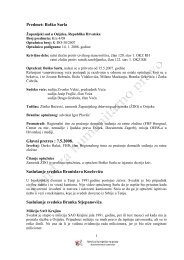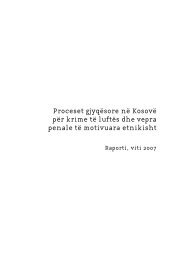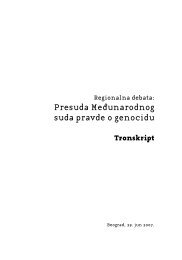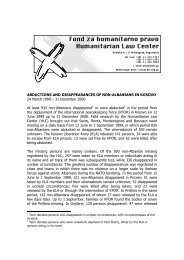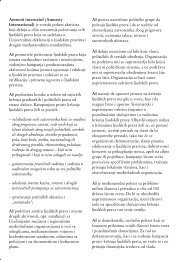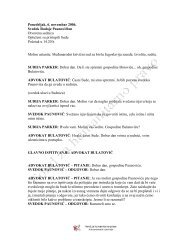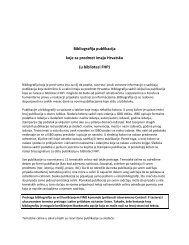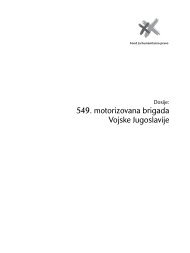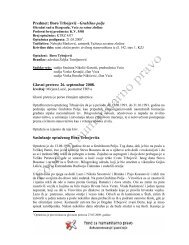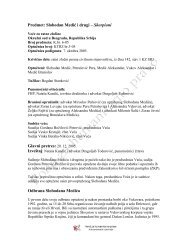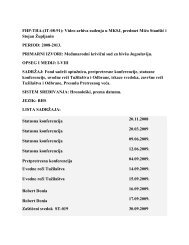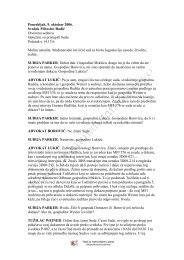here - Humanitarian Law Center/Fond za humanitarno pravo
here - Humanitarian Law Center/Fond za humanitarno pravo
here - Humanitarian Law Center/Fond za humanitarno pravo
Create successful ePaper yourself
Turn your PDF publications into a flip-book with our unique Google optimized e-Paper software.
decision to restrict access to the requested information, that is, it had failed to explain how access<br />
to requested information – copies of rulings – could seriously impede further conduct and<br />
conclusion of court proceedings.”<br />
Decisions made by court administration and management departments that regulate this matter<br />
are inconsistent. The Supreme Court of Cassation, for example, in Article 4 of its guidelines for<br />
data change and removal (anonymi<strong>za</strong>tion) in court decisions, passed on of 27 May 2010,<br />
expressly prescribes that the personal data of accused and convicted individuals should not be<br />
anonymized in court decisions rendered in war crimes, organised crime or money laundering<br />
cases. The Court of Appeal in Belgrade, on 26 April 2012 amended its procedures on<br />
anonymi<strong>za</strong>tion by amending the guidelines for minimum anonymi<strong>za</strong>tion of court decisions,<br />
adopting a method identical to that used by the Supreme Court of Cassation. Unlike these<br />
institutions, the High Court in Belgrade has not posted new guidelines on its website, so it<br />
remains unclear if they exist or not.<br />
The Office of the War Crimes Prosecutor is an example of good practice in this respect.<br />
Immediately after bringing an indictment, the Office of the War Crimes Prosecutor posts the text<br />
of the indictment on its website, featuring the names of the accused (but withholding their other<br />
particulars in order to protect their privacy) and the names of witnesses and other participants in<br />
the proceedings.<br />
11. Media reporting on war crimes trials in Serbia<br />
Impartial, thorough and analytical reporting on war crimes trials is essential to the process of<br />
facing the past and reconciliation. This process will succeed only if society is properly informed<br />
of the facts regarding victims and perpetrators of crimes as established by the courts. In this<br />
sense, the media have not only social and ethical but also legal responsibility. 25<br />
That said, media reporting on war crimes trials in Serbia falls well short of this ideal. As in<br />
previous years, in 2012 the media in Serbia paid very little attention to war crimes trials<br />
conducted before domestic courts. Newspaper report covering this topic are very short, providing<br />
only essential facts, in the form of short straight news stories. Reporting is selective and varies<br />
depending on whether Serbs are victims or perpetrators. Press releases from government<br />
institutions are carried in a completely uncritical manner. Victims of crimes and their fates are<br />
25<br />
Article 51 (1) of the Constitution of the Republic of Serbia: “Everyone shall have the right to be informed<br />
accurately, fully and timely about issues of public importance. The media shall have an obligation to respect this<br />
right.”<br />
14




